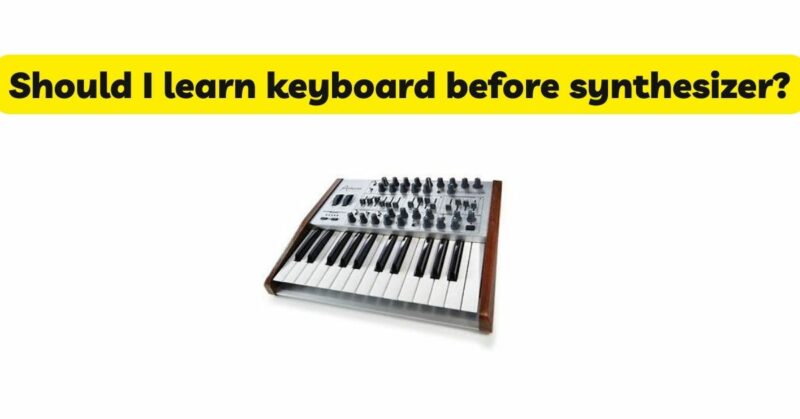Embarking on a musical journey with synthesizers can be an exciting prospect, but for those new to the world of electronic music, the question often arises: Should I learn keyboard before delving into synthesizers? While there is no strict rule, understanding the fundamentals of keyboard playing can greatly benefit your exploration of synthesizers. In this article, we will examine the advantages of learning keyboard before diving into synthesizers and how it can lay a solid foundation for your musical development.
I. The Importance of Keyboard Skills: Keyboard skills serve as a foundation for understanding music theory, developing technique, and unlocking the potential of any keyboard-based instrument. Regardless of the specific instrument you choose, here are several reasons why learning keyboard skills can be beneficial:
- Music Theory Understanding: Keyboard instruments, including synthesizers, are often arranged in a similar layout with a set of keys representing different notes. By learning keyboard skills, you gain a visual and tactile understanding of music theory concepts such as scales, intervals, chords, and progressions. This knowledge will prove invaluable when exploring the harmonic possibilities of synthesizers.
- Technique Development: Learning keyboard skills helps develop proper finger technique, hand coordination, and finger dexterity. These skills are transferable to synthesizers, as they also require precision and control in playing. Building a foundation in keyboard playing allows you to execute melodies, chords, and complex musical passages more effectively.
- Note Recognition and Ear Training: Playing the keyboard facilitates note recognition, ear training, and pitch recognition. These skills are essential for understanding melodies, transcribing music, and improvising. By honing your ear on the keyboard, you can better identify and reproduce pitches and intervals when exploring synthesizer sounds and creating music.
- Music Performance and Ensemble Playing: Keyboard skills prepare you for collaborative music-making and ensemble playing. By learning keyboard techniques, such as dynamics, expression, and timing, you develop the ability to interact with other musicians effectively. This experience will prove invaluable when collaborating with others using synthesizers in bands or ensembles.
II. The Role of Synthesizers: While keyboard skills are valuable, it is important to acknowledge the unique qualities of synthesizers. Synthesizers offer a world of sonic possibilities and sound design capabilities beyond traditional keyboard instruments. Here are some key considerations when incorporating synthesizers into your musical journey:
- Creativity and Exploration: Synthesizers allow for experimentation and creative exploration, enabling you to sculpt unique and innovative sounds. Their vast range of timbres, effects, and synthesis techniques can take your musical expressions to new heights. While keyboard skills provide a solid foundation, synthesizers offer an avenue for exploring new sonic territories.
- Sound Design and Programming: One of the primary features of synthesizers is the ability to program and design sounds. Learning the basics of synthesis, such as oscillators, filters, envelopes, and modulation, can enhance your understanding of sound design principles. This knowledge will empower you to create custom sounds that reflect your artistic vision.
- Modern Music Production: Synthesizers are prominent in modern music production, including electronic, pop, and various other genres. Learning to use synthesizers effectively can open doors to producing electronic music, creating soundscapes, and incorporating unique textures into your compositions. Synthesizers serve as powerful tools for music production, complementing traditional keyboard instruments.
III. The Learning Process: Understanding the interplay between learning keyboard skills and exploring synthesizers can help you determine an effective learning path. Here are some suggestions for incorporating both aspects into your musical journey:
- Establish a Foundation: Start by learning the basics of keyboard skills, including note recognition, finger technique, and music theory concepts. This foundation will equip you with the necessary skills to play melodies, chords, and progressions.
- Integrate Synthesizer Exploration: As you develop your keyboard skills, gradually introduce synthesizers into your practice routine. Begin by exploring the built-in sounds and presets, experimenting with different timbres and effects. Simultaneously, delve into the fundamentals of synthesis to understand how sounds are created and manipulated.
- Collaborate and Experiment: Engage with other musicians, both keyboard players and synthesizer enthusiasts, to collaborate and exchange ideas. This interaction can broaden your musical horizons and inspire new approaches to using synthesizers.
- Expand Your Knowledge: Continue to deepen your knowledge of keyboard playing and synthesizers simultaneously. Explore advanced techniques, music theory concepts, and sound design principles. This ongoing learning process will enhance your overall musicality and proficiency with both instruments.
IV. Conclusion: While there is no strict requirement to learn keyboard before diving into synthesizers, understanding the fundamentals of keyboard playing can significantly benefit your exploration of synthesizers. Keyboard skills provide a solid foundation in music theory, technique, and note recognition, which are invaluable when navigating the possibilities of synthesizers.
Synthesizers offer a unique avenue for sonic exploration, sound design, and modern music production. By combining the foundation of keyboard skills with the creative possibilities of synthesizers, you can develop a well-rounded approach to music-making and tap into a wide range of expressive possibilities.
Ultimately, the decision to learn keyboard before synthesizers depends on your musical goals, preferences, and learning style. Regardless of the order, embracing both keyboard skills and synthesizers will enrich your musical journey and allow you to express your creativity in new and exciting ways.


